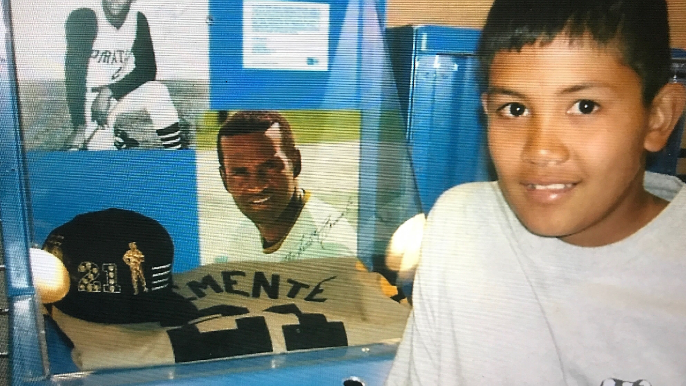Eddie Garcia still remembers the feeling on New Year’s Eve, 1972. He didn’t want to believe it. Then he didn’t want to forget it.
For months after TV news revealed to him and friends that Roberto Clemente, his and Puerto Rico’s hero, had died in a plane crash delivering aid to earthquake victims in Nicaragua, he wore a black handkerchief on his arm on which he scrawled Clemente’s number: 21.
“I would not take it off,” Garcia, a Puerto Rico native, said over the phone Wednesday from his Hawaii home. “I’d have it on, put on my uniform, go out and play some ball in the pueblo.”
He wanted to honor the player who made him believe he could have a future in baseball; “everybody wanted to be Clemente, everyone wanted to be Orlando Cepeda.” He wanted to ensure that No. 21 would forever go down in baseball lore in saluting a Hall of Famer but also a man who never forgot Latin America.
Garcia was a young baseball star in Puerto Rico and Connecticut, but ended up joining the Army, which took him to Hawaii, where he started a family. His amateur playing days are over, having hurt his leg sliding into second in a softball game in 1988, which led to his discharge from the military. The 60-year-old Garcia does not have the platform to publicly honor his hero, so he made sure to pass the legacy down and was thrilled to learn MLB was earmarking a day for Clemente.

“I didn’t even know about it until my dad told me,” Giants reliever Rico Garcia said.
On Wednesday against the Mariners at Oracle Park, Rico Garcia will be wearing the same 21 on his back that his father wore on his arm 48 years ago. Giants quality-control coach Nick Ortiz, too, will honor Clemente on a day MLB set aside to let the world remember a person who “gave every Puerto Rican the el orgullo (the pride) to be a Latino playing baseball,” Eddie said.
Eddie was 12 when Clemente died after 3,000 hits exactly, becoming the second player ever whose five-year wait time was waived by the Hall of Fame.
Rico, who grew up in Hawaii, was 12 when his father brought him to Cooperstown in 2006. They gazed at Clemente’s national legacy before heading to the more local one. From Upstate New York they drove the seven hours southwest to Pittsburgh, where they took in the Home Run Derby and All-Star festivities — and a park that is part mural to the legendary Pirates right fielder.
Eddie wanted to pass down the messages and stories of a player who’s synonymous with both greatness and charity. And he did, as Rico recently was able to quote his father’s hero: “If you have an opportunity to accomplish something that will make things better for someone coming behind you, and you don’t do that, you are wasting your time on this Earth.”
Eddie remembers rushing to his Puerto Rico home to watch Clemente play on black-and-white TVs before heading out to play baseball with broomsticks and rocks. But it’s the humanitarian in Clemente that he most admired, an icon who hosted free baseball clinics for underprivileged youth, whose devotion to caring for vulnerable people led to his death.
“Just the way he carried himself about his people and ours — the Puerto Ricans, Latinos, anybody, it doesn’t matter who it was — just the way he carried himself, everybody wanted to be as good as he was,” Eddie said before a game he was eager to see, noting Garcia did not pitch Tuesday and thus had a better chance of pitching Wednesday.
When Rico Garcia, who came up with Colorado, was in the minors, his brother worked for United Airlines. Eddie had a connection and could travel the country without charge, so he followed Rico’s team around the United States for a season. He remembers not having a place to stay in Boise, Idaho, so he slept at a rest stop, then showed up at the park early the next day. He didn’t want to miss a game.
In the year of the coronavirus and Rico’s first with the Giants, his father cannot attend any games. But he’ll watch on a color TV from Hawaii, where he will be celebrating with friends and family and watching a Garcia wear No. 21 in the major leagues. He wants the number retired one day, as does Ortiz. But for one game, he would be happy Major League Baseball has not taken that step.
“When I found out about it, things started hitting my head,” Eddie said. “It makes a grown man cry. The pride in you saying yes, represent Clemente.”



